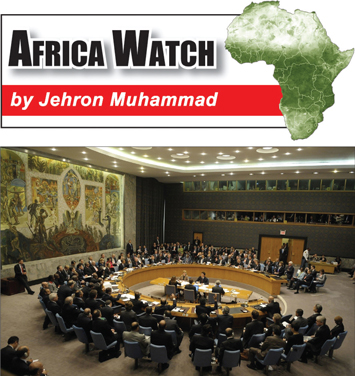Israelis, arms deals and flooding South Sudan with weapons
By Jehron Muhammad | Last updated: Sep 11, 2019 - 10:03:25 AMWhat's your opinion on this article?

|
In 2010 a headline in Israel’s longest continuous running newspaper, Haaretz, asked, “Why are so many Israelis arrested over illegal arms deals worldwide?”
Haaretz, in the report, exposed seven former members of the Israel Defense Forces (IDF) who had reached mid-level ranks from captain to lieutenant-colonel. When they were arrested, they vehemently denied the charges. Friends that came to each one’s defense described them as “the salt of the earth.”
All seven men were very familiar faces in the corridors of the defense establishment, with several involved in arms dealing in multiple African countries. Each, at one time, received arms dealing permits from the Defense Ministry. In addition, they all sought to “expedite procedures in violation of local or international laws, and did so out of pure greed. Due to this covetousness, they also fell into traps and can expect to face many years in jail.”
Now fast forward to 2018 and we discover the U.S. Dept. of Treasury citing retired Israeli Defense Forces Major General Israel Ziv for using an agriculture company as a “cover” for the sale of $150 million worth of weapons to the government of South Sudan. “Through bribery and promises of security support,” the Treasury Dept. asserts he actually increased his profits through organized attacks by opposition mercenaries on the country’s oil fields and infrastructure “in an effort to create a problem that only his company and affiliates could solve.”

UN Security Council in session. Photo: UN.org
|
The co-author of the 2013 book, “Why Israel? The Anatomy of Zionist Apartheid: A South African Perspective,” Suraya Dadoo, wrote recently on Amman, Jordon-based news and media website Albawaba that the Israeli Ministry of Defense continues to grant export licenses to Israeli weapons companies selling $150 million worth of lethal weapons through the Green Horizon project to South Sudan.
“Think about that for a minute. A country (South Sudan) in which crimes against humanity are perpetrated at this very moment, using foreign weapons and under a complete weapons embargo by the U.S. and Europe, sends a military acquisitions delegation to Israel and it is welcomed with open arms,” said Israeli lawyer Eitay Mack.
Dadoo writes that since Sudan, via a referendum, became Africa’s and the world’s youngest nation state in 2011, the Jewish state has continuously sold it “weapons, surveillance technology and provided military training and security, much of which has been used to commit war crimes, and potentially crimes against humanity in the civil war that began in 2013.”
Why the American mainstream, corporate-run media has not made this “criminal” enterprise, blasted by the UN Security Council and U.S. Treasury Dept., public is anyone’s guess. With Israeli-made small arms mysteriously ending up in rebel hands around the globe, and Israel being the trainer of many U.S. police departments, who in recent years began accumulating military grade hardware, it wouldn’t be a stretch to suggest that some of these weapons could be filtering into the streets of America. But with mainstream journalists like CNN’s Jake Tapper wrongfully comparing the long-subjugated Palestinians with America’s growing White supremacist mass shootings, with military grade automatic or semiautomatic weapons, it might be a stretch to think the U.S. media would follow a trail that may lead to Israel.
As Haaretz, mouthing a recent Amnesty International report on Israel’s illicit arms trade, noted, “Often these weapons reach their destination after a series of transactions, thereby skirting international monitoring and the rules of Israel itself.”
Author and Ph.D. candidate Yotam Gidron, in a paper taken from his dissertation in African studies at the University of Oxford and published in 2018 in the Journal of Eastern African Studies titled, “One People, One Struggle: ”Anya-Nya propaganda and the Israeli Mossad in Southern Sudan, 1969-1971,” provides revealing information. He explores Israel’s historical relationship with Southern Sudan via Mossad.
Gidron wrote, “From 1961, Southern Sudanese politicians appealed for Israeli assistance in their struggle against the Sudanese government. Israelis saw great potential for anti-Arab propaganda in the Southern cause, but did not extend any significant support to the rebels until 1969. When they eventually did, they also embarked on a secret propaganda campaign on behalf of the Anya-Nya (rebel group), seeking to promote the Southern struggle globally in order to delegitimize Arab nations and their Soviet supporters and draw attention away from anti-Israeli and pro-Palestinian propaganda in the aftermath of the Six-Day War of 1967. Unlike earlier Southern Sudanese publications, the Israeli materials made extensive use of photographs and projected a new image of the Southern Sudanese leadership and its relationship with civilians.” The publications, his paper argues, advanced both Israeli and Southern Sudanese interests, and reflected both Southern Sudanese and Israeli notions of nation-building.
What could also be revisited is who benefited and who was at the root of circumstances leading up to the referendum and creation of South Sudan and the subsequent failure of the economy of northern Sudan, which was dependent on the oil reserves based in the South?
In Gidron’s soon to be released book “Israel in Africa,” he discusses Israel’s arms exports to African countries as a fundamental component of the Jewish state’s diplomacy on the continent.
“For decades,” he notes, “Israel has invested very little in its formal diplomacy in the continent and has instead relied on various private entrepreneurs and intermediaries to sustain its relationships with African leaders. This is a prime example of the middle-man approach to diplomacy that Israel has employed in Africa.”
Dadoo says even with freedom of information requests, it’s all but impossible to access Israel’s Defense Ministry documents or contracts concerning arms deals.
“Freedom of information requests have been filed with Israel’s Defence Ministry, seeking documents concerning Israeli arms deals, consulting contracts, and training of armed forces not only in Southern Sudan, Rwanda … during decades of genocide and ethnic conflict in those nations.”
According to Dadoo, in every instance, the ministry denied the requests, and upon appeal to the Supreme Court, the court sided with the military and “ruled that such information was sealed from public view in order to protect the security of the nation.”
Follow @JehronMuhammad on Twitter
INSIDE STORIES AND REVIEWS
-
-
About Harriett ... and the Negro Hollywood Road Show
By Rabiah Muhammad, Guest Columnist » Full Story -
Skepticism greets Jay-Z, NFL talk of inspiring change
By Bryan 18X Crawford and Richard B. Muhammad The Final Call Newspaper @TheFinalCall » Full Story -
The painful problem of Black girls and suicide
By Charlene Muhammad -National Correspondent- » Full Story -
Exploitation of Innocence - Report: Perceptions, policies hurting Black girls
By Charlene Muhammad -National Correspondent- » Full Story -
Big Ballin: Big ideas fuel a father’s Big Baller Brand and brash business sense
By Bryan Crawford -Contributing Writer- » Full Story






 Click Here Stay Connected!
Click Here Stay Connected!








